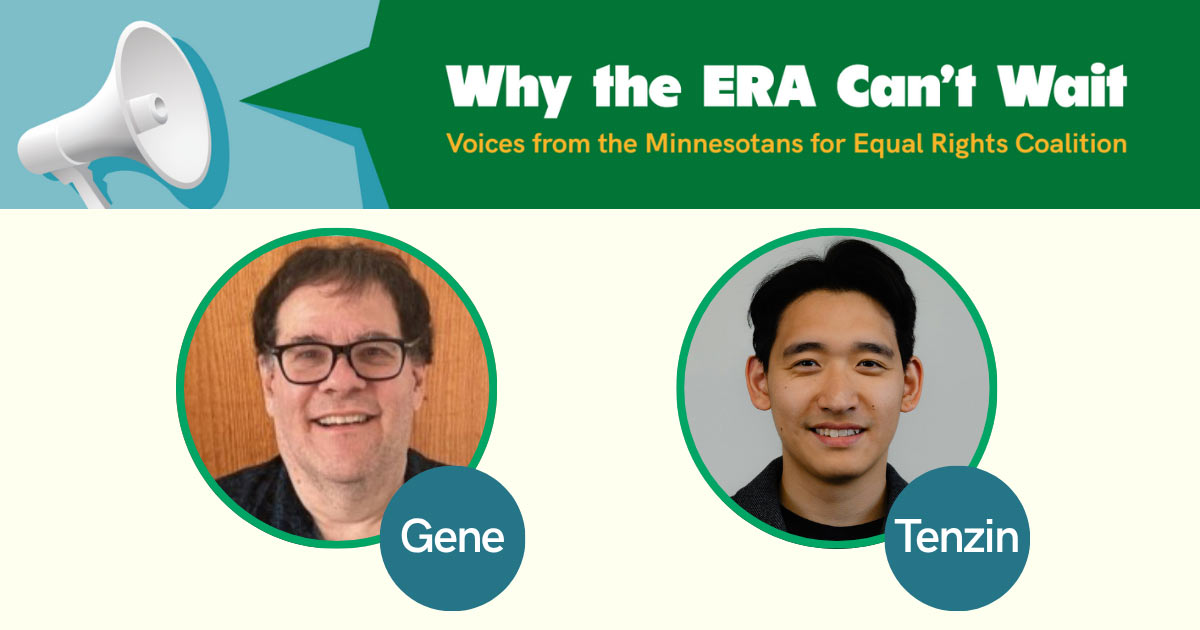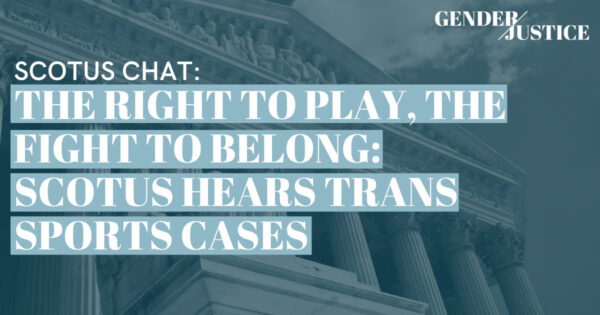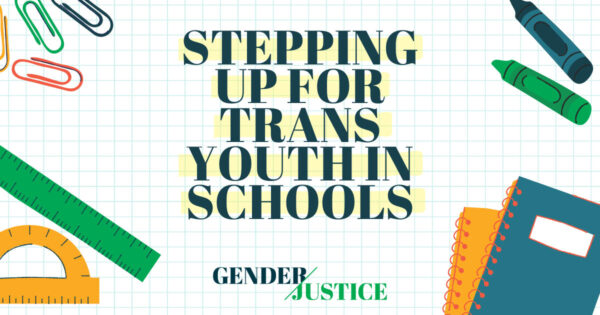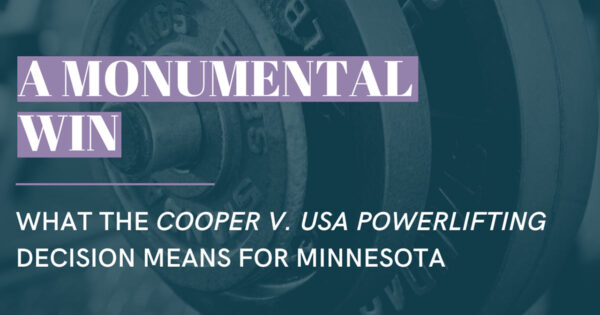
Minnesota has been a North Star for progress. We’ve defended abortion access, protected trans lives, and expanded care when other states did the opposite. But with Trump back in the White House and attacks on equality escalating, we’re seeing how fast progress can be undone.
The truth is, our state constitution still doesn’t explicitly protect all of us. That’s why the Minnesotans for Equal Rights (MN4ER) coalition is growing, and why we’re working to pass a strong, inclusive Equal Rights Amendment (ERA). In a time of mounting national threats, the ERA is how we make our rights permanent, bake equality into the foundation of our state laws, and protect what we’ve built from being rolled back.
Gender Justice is proud to be part of this movement, alongside partners who know how deeply inequality shapes people’s lives. We spoke with two MN4ER members—Gene Martinez (he/him/his) from The Arc Minnesota and Tenzin Choesang (he/him/his) from Future of Us—about what the ERA means in their communities, and why it can’t wait.
What does your organization do, and what communities do you work with most closely?
Gene: The Arc Minnesota is a statewide advocacy organization serving people with intellectual and developmental disabilities. We provide public policy advocacy, grassroots engagement, individual advocacy, and a variety of housing and other support to individuals in the disability community to ensure they can have a quality life in the community. We were formed in the late 1940s and are headquartered in St. Paul with regional offices in St. Cloud, Rochester, Mankato, and Moorhead.
Tenzin: Future of Us (formerly Asian American Organizing Project) is an organization that believes in empowering young Asian Minnesotans, and unlocking their collective social and political power. The work at Future of Us is rooted in storytelling, advocacy, and community building, ensuring that young Asian Minnesotans are seen, heard, and influential in leadership and decision-making spaces.
When you hear “Equal Rights Amendment,” what comes to mind?
Tenzin: The Equal Rights Amendment brings to mind the ability to live up to our ideals. That everyone, regardless of what they look like, where they come from, who they love, etc., deserves a fair shot and should not be discriminated against because of these factors.
Gene: The ERA means full access to rights regardless of sex, sexual orientation, disability status, race, religion, national origin, gender, and other factors. For people with disabilities, there are existing constitutional protections for due process and equal treatment under the 14th Amendment. There are also statutory protections like the Americans with Disabilities Act (ADA), Section 504, and the Minnesota Human Rights Act. The Minnesota ERA would strengthen all of these existing protections by adding protections based on disability status to the Minnesota Constitution and making it easier to enforce disability rights laws.
A lot of Minnesotans think we already have equal rights under state law. Why do you think we need the ERA in Minnesota?
Gene: We believe it is critical to explicitly name these rights in the state constitution. Why? Because laws can change. Statutes can be repealed or weakened with a simple vote in the legislature, but constitutional protections are harder to undo, requiring a majority of all people who voted. Plus, while control of the legislature frequently changes between parties, a constitutional amendment provides ongoing protections.
Tenzin: The Minnesota Constitution does not explicitly protect against discrimination based on the characteristics listed in the Minnesota ERA. There are a few laws and statutes that concern these groups or identities, but having it enshrined in our constitution not only makes it harder to get rid of, thereby making it much more effective, but also allows our state to continue in its affirmation to protect all Minnesotans. It’s fair, equitable, and the right thing to do, and many people can agree that everyone should be treated with equal rights under state law.
Can you share a real-world example that shows why stronger protections in the constitution would make a difference for your community?
Tenzin: One important aspect of the Minnesota ERA is its emphasis on protecting reproductive rights. Studies we’ve conducted show that over 80% of young Asian Minnesotans support reproductive rights, in particular abortion access. This is similar to the national average of around 75%.
Additionally, the ERA includes a provision to ensure the state does not discriminate, which would ensure that immigrants, refugees, and limited-English speakers are aware of and able to enroll in state and federally funded public services, such as Supplemental Nutrition Assistance Program (SNAP), housing support, and/or refugee cash assistance.
Gene: The Minnesota ERA would protect reproductive autonomy for people with disabilities and safeguard decisions related to pregnancy, preventing the state from interfering in the reproductive choices of people with disabilities. Historically, people with disabilities were subject to forced sterilization laws. Having protections against forced sterilization and having reproductive choices like abortion are both necessary.
What would it mean to your community to see the ERA pass? What kind of message would that send?
Gene: It would send a powerful message: discrimination of any kind against individuals will not be tolerated! And that explicitly includes discrimination against people with disabilities. This work is intersectional. People with disabilities exist across every identity—race, gender and gender expression, sexual orientation, and more. The Minnesota ERA creates a stronger, more inclusive community by recognizing and protecting those overlapping identities.
Tenzin: The passage of the state ERA would be a great victory not only for the immigrant community, but for all Minnesotans. We would be able to see that our government listens to the people, as over 75% of the people support reproductive rights and abortion access. It would also show our community that our government also prioritizes the protection and needs of those most vulnerable and in danger of exploitation.
What would you say to someone who supports equality but isn’t sure the ERA is really necessary?
Tenzin: We are encountering interesting—and, for many we serve, scary—times. A constitutional amendment prohibiting the discrimination of those who may be our family, friends, and neighbors isn’t just a “feel good” gesture, but one that may have life changing, longlasting impacts across future generations of Minnesotan families and communities.
Gene: While it might be tempting to believe that existing federal anti-discrimination laws or the Minnesota Human Rights Act make a Minnesota ERA unnecessary, that would be a mistake. Why? Voting rights, affirmative action, DEI, and even recognition of past discrimination are being rolled back throughout the nation. As those federal laws are weakened, we need strong state-level human rights protections. The Minnesota ERA provides expanded protections to many people, and we need that to protect not only the disability community, but all groups who face discrimination.
Recent Commentary
- SCOTUS Hears Trans Sports Cases
- How Schools and Educators Can Step Up for Trans Youth
- Three Things to Know About the Landmark Cooper v. USA Powerlifting Win
- Fall 2025 Newsletter & Annual Report
- Anti-LGBTQ+ Censorship in Public Schools
- Skrmetti’s Impact on Gender-Affirming Care in MN & ND
- Spotlight: How to Have Meaningful Conversations on Trans Rights
- The People’s Session: North Dakotans Chart Their Own Path
- The Real Priorities of North Dakotans Are Being Ignored
- What to Know About Trump Admin’s HHS Junk Science Report on Trans Health Care
Learn more about the topics on this page
Related Content

SCOTUS Hears Trans Sports Cases
On January 13, 2025, the U.S. Supreme Court heard oral arguments in two pivotal cases about transgender students’ right to participate in school sports: Little v. Hecox (Idaho) and West Virginia v. B.P.J. At the heart of both cases is the question of whether state laws that ban transgender girls from playing on girls’ sports teams violate either Title IX or the Equal Protection Clause of the U.S. Constitution.

How Schools and Educators Can Step Up for Trans Youth
In a special Trans Equity Training this fall, special guest speaker Rebecca Allen — a community leader, recent graduate from the University of Minnesota’s Master of Public Affairs Program, and a proud parent of two — shared her research on best practices for schools to support trans and non-binary students.

Three Things to Know About the Landmark Cooper v. USA Powerlifting Win
On October 22, 2025, the Minnesota Supreme Court issued a historic, unanimous decision in Cooper v. USA Powerlifting. This ruling not only powerfully asserted the rights of transgender athletes to fully participate in sports, it explicitly affirmed transgender Minnesotans’ dignity and place in our state. We invited community members to a briefing breaking down this landmark decision and its impact.

Milestones of Progress
Our organization has celebrated some big wins over the years and we continue to grow in the ways we harness strategic impact litigation, legislative advocacy, and education to push the law forward when it comes to gender equality. Check out what we’ve accomplished, together.